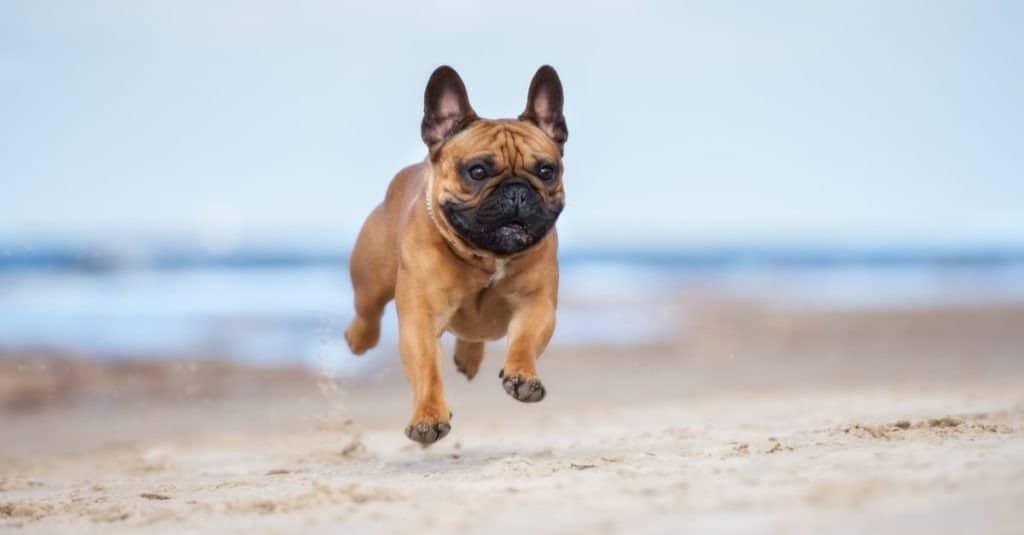French bulldogs are known for their charming personality, affectionate demeanor, and loyal companionship. They have surged in popularity moving from the 14th most popular breed in 2012 to the 2nd most popular in 2021, with a registration increase of over 1,000% during this time. As of 2022, The American Kennel Club announced that the French bulldog has usurped the Labrador retriever as the most popular dog breed!
One question often asked about the breed is this: Can French bulldogs swim? No, they cannot due to their front-heavy structure, their propensity to breathing problems, and their limited stamina. Let’s examine nine important precautions to take regarding French bulldogs and swimming.
1. Front-Heavy Structure

This breed is so top-heavy because of its large head and front end.
©Andy Gin/Shutterstock.com
French bulldogs’ heads and front ends are large in proportion to the rest of their body. Accordingly, this front-heavy stature makes the breed susceptible to sinking. They possess bulky torsos, thick muscles, and weighty bones, so they cannot keep themselves afloat. Additionally, the breed’s short legs compound this problem of top-heaviness and the dog’s propensity for dropping beneath the water’s surface.
2. Flat, Short Snouts

French bulldogs are known for their short, flat snouts.
©Lionel Nganga/Shutterstock.com
French bulldogs cannot swim in part because they, like all bulldogs, have brachycephaly. This condition means that they have a wide, short skull which provides them with their distinctive “squashed” face. This abbreviated muzzle leaves them with very little room to breathe while in the water. Because they have flat noses, they have to tilt their heads higher than other breeds to keep them above the water’s surface.
3. Breathing Problems

The structure of its face lends this breed to having breathing problems.
©Tatianasoba/Shutterstock.com
All flat-faced dog breeds are prone to breathing problems, and “Frenchies” are especially prone to them. Brachycephalic Airway Syndrome (BAS) is a respiratory condition that affects dogs more than cats. BAS manifests in French bulldogs through their elongated and soft palate, which blocks the passage of air through the larynx (voice box). Signs that your Frenchie may have BAS are a low tolerance to exercise, an extensive cooling-off period, retching or vomiting, and heavy snoring, breathing, or wheezing.
This inclination toward breathing problems also means that French bulldogs tend to suffer more than other breeds in hot temperatures, extreme humidity, altitude changes, and intense stress. All of these factors would hypothetically come into play if a French bulldog were attempting to swim.
4. Limited Stamina

Frenchies don’t need as much exercise as most breeds.
©Ian McGlasham/Shutterstock.com
Due to their short-size status and aforementioned physical structure and breathing issues, this breed does not require the rigorous exercise schedule as most. Although they love to frolic and play, Frenchies do not possess the stamina for a lengthy workout or play period. While this fact makes them an ideal choice for an apartment dog, it also contributes to why this breed cannot swim. All of the other physical limitations would require increased — not decreased — stamina for them to be able to keep their heads above water.
With all of its limitations to swimming, what can pet owners do to provide a safe swimming experience?
5. Life Jackets

This breed loves the water although it is not suited for it.
©otsphoto/Shutterstock.com
Never leave your Frenchie near water for any length of time without your eyes on your precious pet. This breed will sink fast in a relatively shallow amount of water, so extreme diligence is required.
However, with human assistance and a life jacket, Frenchies can enjoy a limited amount of time in the water. Procuring a life preserver made specifically for this breed is essential: It must be snugly fitted and have a top handle so that its owner can quickly pull it out of the water when the dog’s head submerges beneath the surface.
6. Kiddie Pools and Creeks

Frenchies can enjoy limited time in shallow water.
©Cast Of Thousands/Shutterstock.com
During hot and humid summer days, get your dog a kiddie pool so that he can get a reprieve. Also, if you are near a mountain stream or creek, letting your French Bulldog get in extremely shallow water can help him cool off. Again, any water play at all must be human-supervised whether you are in your backyard or a bubbling brook.
7. Alternative Water Options

There are lots of ways to cool off a hot French bulldog.
©Firn/Shutterstock.com
Frenchies can escape the heat even without a body of water. Interactive water toys or even a small, cheap sprinkler can give your dog respite from the heat.
8. Indoor Exercise

French bulldogs love to play indoors.
©Lined Photo/Shutterstock.com
Sometimes, especially if you live in an extremely hot and/or humid environment — such as the Deep South or Arizona — indoor exercise may be your only choice. You can play fetch, hide-and-seek, or provide coveted chew toys so that your dog can get his physical activity requirements indoors.
9. Saltwater Warning

Saltwater can be dangerous for any breed.
©wallix/iStock via Getty Images
One final word of warning: Be vigilant around saltwater, even when your dog is on a short leash. Per the American Kennel Club, when a dog drinks salt water, water draws from the blood into the intestines which can easily lead to diarrhea, vomiting, and dehydration. Because saltwater poisoning can lead to death, especially in smaller dogs such as Frenchies, always have a supply of fresh water for your pup when visiting the beach or any body of saltwater.
The photo featured at the top of this post is © dezy/Shutterstock.com
Ready to discover the top 10 cutest dog breeds in the entire world?
How about the fastest dogs, the largest dogs and those that are -- quite frankly -- just the kindest dogs on the planet? Each day, AZ Animals sends out lists just like this to our thousands of email subscribers. And the best part? It's FREE. Join today by entering your email below.
Thank you for reading! Have some feedback for us? Contact the AZ Animals editorial team.






